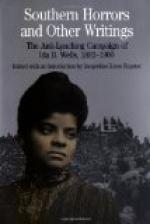The Negro tough, on the contrary, is given
to just that kind of
offending, and he almost invariably singles
out white people as his
victims.
On March 9, 1892, there were lynched in this same city three of the best specimens of young since-the-war Afro-American manhood. They were peaceful, law-abiding citizens and energetic business men.
They believed the problem was to be solved by eschewing politics and putting money in the purse. They owned a flourishing grocery business in a thickly populated suburb of Memphis, and a white man named Barrett had one on the opposite corner. After a personal difficulty which Barrett sought by going into the “People’s Grocery” drawing a pistol and was thrashed by Calvin McDowell, he (Barrett) threatened to “clean them out.” These men were a mile beyond the city limits and police protection; hearing that Barrett’s crowd was coming to attack them Saturday night, they mustered forces, and prepared to defend themselves against the attack.
When Barrett came he led a posse of officers, twelve in number, who afterward claimed to be hunting a man for whom they had a warrant. That twelve men in citizen’s clothes should think it necessary to go in the night to hunt one man who had never before been arrested, or made any record as a criminal has never been explained. When they entered the back door the young men thought the threatened attack was on, and fired into them. Three of the officers were wounded, and when the defending party found it was officers of the law upon whom they had fired, they ceased and got away.




